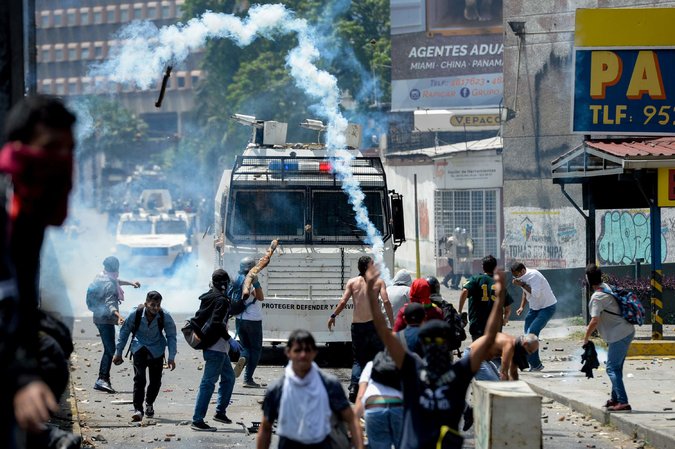City-wide protests have occurred daily throughout Venezuela, a politically divided and economically destitute country, which was once South America’s wealthiest nation. Police meet protesters with rampant arrests, tear gas, and rubber bullets. Since the beginning of April, hundreds of thousands of Venezuelans have protested President Nicolás Maduro’s socialist government and its perpetration of the nation’s ever-worsening economic crisis. Initially comprised of students, youth, and members of the middle class, the opposition movement’s base grows daily. As the quality of life in Venezuela continues to spiral, the opposition increasingly gains support from those once faithful to the socialist agenda, the lower class. The sustained global drop in oil prices and prolonged drought have only worsened matters for the public, who struggle daily to obtain essentials like food and medicine. Protesters demand new elections and release of political prisoners, hoping that a change in the socialist leadership will end the crisis.
Since the mid-20th century, petroleum extraction and exploitation have been the foundation of Venezuela’s economic structure. The Venezuela of the 1950s was poised to be a major player in international petroleum exportation; intent on sembrando el petróleo (sowing the oil), the nation relied on its massive oil wealth to advance society. To maximize oil exports, investors financed alternative energy production for domestic servicing. Most notably, the Guri Dam generates 60% of Venezuela’s energy through hydroelectric power.
In the early 2000s, the late president Hugo Chávez leveraged Venezuela’s massive oil wealth and the global upswing in oil prices to create an unsustainable social welfare state. He implemented sweeping nationalization of Venezuela’s economy, primarily in the oil sector, in pursuit of his socialist utopia. Chávez expanded the state-owned oil company Petróleos de Venezuela, or PDVSA, and its dominion over oil extraction and production. Chávez’s frenetic charisma, combined with frequent government handouts, projected an image of resolute national prosperity while masking the regime’s internal corruption. Many Chavistas still await the ‘Bolivarian Revolution’ that Chávez promised.
Maduro, Chávez’s successor, inherited an economy wholly propped up by the nationalized oil industry. Maduro’s financial mismanagement and authoritarian actions set the nation on a fast-track toward recession, even prior to the 2014 collapse of global oil prices. Domestic oil production is dropping at an accelerated rate, with drilling sites and refineries falling into disrepair. The government and PDVSA are strapped with nearly $60 billion in international debt in the form of short-term bond payments. Meanwhile, the government is failing to import food, medicine, and other essentials at a sufficient rate to meet the dire demand. With inflation rates just over 800%, most Venezuelans are unable to afford food and many report significant weight loss. Waiting hours on end for food rations at government controlled food-distribution centers is an every-day reality. Additionally, the Guri Dam is largely out of commission due to a prolonged drought and the government imposed a two-day workweek to cope with frequent power outages. Venezuela’s economy is in abysmal shape and the prospects of a positive change are wholly dependent upon an upswing in global oil prices.
A highly controversial supreme court ruling sparked the most recent round of protests in Venezuela. The nation’s supreme court is notoriously beholden to Maduro and the socialist regime established by Chávez. Meanwhile, the opposition-controlled National Assembly represents the sole counter to the United Socialist Party’s total control over the government. On March 31, 2017 Venezuela’s supreme court stripped the National Assembly of its legislative, justifying this power-grab by holding the National Assembly in contempt of the laws of the nation. Three members of the National Assembly face accusations, by President Maduro, of administrative impropriety in winning their elections, thus enabling the supreme court to hold the entire legislature in contempt. The supreme court was set to take over all responsibilities and functions of the legislature. Domestic and international condemnation were quick to criticize this decision, a move that many considered “a rupture in the constitutional order” and Maduro’s attempt to create a “petty dictatorship.” In the face of such scrutiny, the supreme court rolled back some of its decision on April 1, however, President Maduro retains unfettered power “to enter into joint oil ventures without congressional approval.” One faction of the opposition considers the rollback further proof that the supreme court is in Maduro’s pocket, while others believe it reveals cracks within the USP’s party-loyalists.
Food scarcity and undemocratic power grabs will be determinative of Maduro’s power retention in 2017. Those loyal to Chávez’s socialist revolution grow disillusioned by the day as they face food shortages and soaring inflation with no prospect of change. Maduro’s regime faces international, regional, and domestic pressures to abide by Venezuela’s constitutionally democratic roots. The call for new elections intensifies as the opposition’s support increases and the nation’s economic crisis worsens. A newly elected official, however, will have to confront the economy’s strict oil dependence and determine how the nation can diversify to succeed in the 21st century. Regardless of any political changes, without an upswing in global oil prices, the crisis will only worsen, violating international human rights norms in the process.


